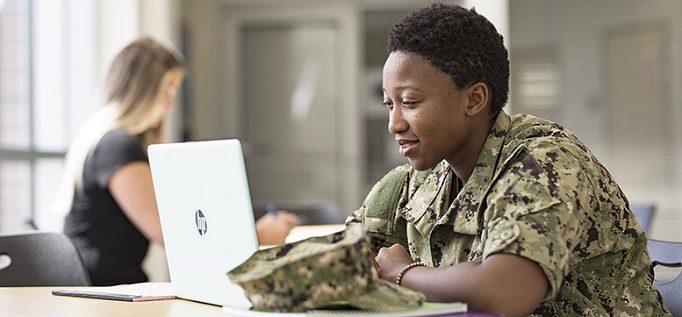Extra support for military students
By Ellie Ashford
August 19, 2020
With many veterans and active-duty military students struggling with the transition to distance learning during the pandemic, a growing number of community colleges are increasing their outreach efforts to help them adjust and succeed.
About 20 percent of the veterans at Mesa Community College in Arizona withdrew during the spring semester, says Bill Clites, director of veterans services. Many of them signed up for regular face-to-face classes and weren’t prepared when Mesa transitioned to distance learning in the middle of the semester, he says.
“Spring started out normal. Then when they found themselves in the COVID-19 world, they couldn’t handle the pressure of online classes,” Clites says.
As with many community colleges across the U.S., Mesa is “a little nervous” about enrollment in the fall, Clites says. Although MCC won’t have those numbers until classes start in late August, Clites expects both veteran and across-the-board enrollment to decline by about 20 percent compared to last fall.
Mesa serves active-duty personnel stationed at the nearby Luke Air Force Base and some from Davis-Monthan Air Force Base, which is farther away. The college enrolls about 1,000 students in what Clites calls “our veteran family,” including about 650 students who receive GI benefits.
Federal help
Legislation passed by Congress (S. 3503) that authorized the U.S. Department of Veterans Affairs (VA) to treat distance learning courses the same as other courses during the COVID-19 pandemic greatly helped many student veterans this spring. As a result, veterans could retain their level of benefits, Clites says.
Previously under the post-911 GI bill, the VA provided a higher level of educational benefits to veterans who take at least one college course in person. That was a way of proving that the student was actually in that location, Clites says.
In another provision of S. 3503, he says the VA allows veterans to take developmental education courses online between March and December 23. Clites hopes that will be extended.
In addition, “the VA was very lenient and compassionate” in allowing debt forgiveness for veterans who had to withdraw from college as a result of mitigating circumstances due to the pandemic, Clites says.
Mesa provides other supports for veterans and their families, including technology loans and a boot camp to help former soldiers returning from overseas deployment adjust to college. College staff stay in constant contact with new veterans, review their grades and help them access tutoring. If a new veteran is struggling, the college connects him or her with another veteran to serve as a mentor.
Enrollment dips
At Tidewater Community College in Virginia, enrollment of students with GI benefits dropped about 40 percent this spring, says Veronica Cianetti, director of military student services. Some students took a semester off because they prefer face-to-face classes. Others were in workforce programs where hands-on classes were canceled, such as trucking, welding and allied health fields.
“For fall, we’re a little more hopeful about enrollment because the VA has done so much,” Cianetti says.
More hands-on classes will be held, and “students will be a little more used to virtual resources,” she says. “We hope some of that will drive their confidence to return.”
About 30 percent of the students at Tidewater are connected to the military as active-duty personnel, members of the reserves, veterans, spouses or dependents. The college certifies about 2,000 students per semester for benefits under the GI bill.
Tidewater has a dedicated VA office at each campus that helps veterans apply for benefits, Cianetti says. Before the pandemic, the college hosted weekly “military Monday” events on campus with information about financial aid, GI bill benefits and state funding to help service members transition to civilian life.
All those services have gone virtual during the pandemic. Academic advisors at nearby military bases also provide online support.
Even though all the support services have moved to a virtual format and students can call a help line, “students still want to talk to someone live,” Cianetti says. “They want to come in and be helped one on one. We’re still finding that a challenge.”
While most classes at Tidewater will be virtual for the foreseeable future, some support services reopened on campus August 10, including military and veteran centers, financial aid and advising.
There’s more to the story! Read the full article in CC Daily.


